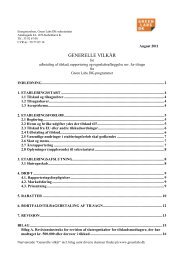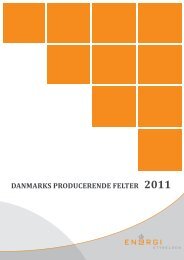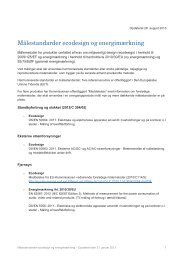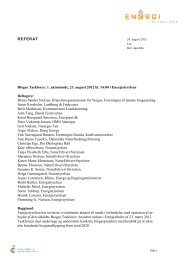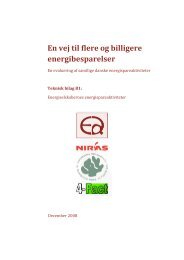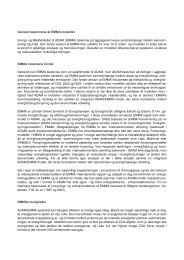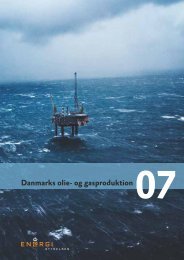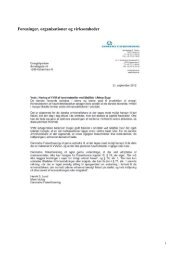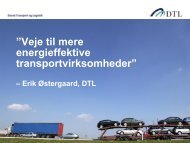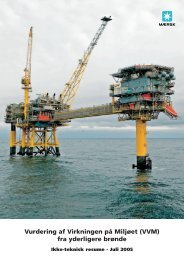Energy Strategy 2050 – from coal, oil and gas
Energy Strategy 2050 – from coal, oil and gas
Energy Strategy 2050 – from coal, oil and gas
Create successful ePaper yourself
Turn your PDF publications into a flip-book with our unique Google optimized e-Paper software.
A new era for energy policy<br />
<strong>Energy</strong> <strong>Strategy</strong> <strong>2050</strong> is a huge step towards realising<br />
the Danish government’s vision of becoming independent<br />
of <strong>coal</strong>, <strong>oil</strong> <strong>and</strong> <strong>gas</strong>.<br />
In 2010 the Danish Commission on Climate Change<br />
Policy concluded that transition to a fossil fuel independent<br />
society is a real possibility. <strong>Energy</strong> <strong>Strategy</strong> <strong>2050</strong><br />
builds on this work.<br />
This strategy is the first of its kind; in Denmark <strong>and</strong> in the<br />
rest of the world. The strategy outlines the energy policy<br />
instruments to transform Denmark into a green sustainable<br />
society with stable energy supply. The strategy is<br />
also fully financed, taking full account of Danish competitiveness.<br />
The strategy presents a wide spectrum of new energy<br />
policy initiatives. These initiatives will already in the short<br />
term considerably reduce fossil fuel dependence. Just in<br />
the period up to 2020, the strategy will reduce the use of<br />
fossil fuels in the energy sector by 33% compared with<br />
2009. In addition, the strategy will increase the share<br />
of renewable energy to 33% by 2020 <strong>and</strong> it will reduce<br />
primary energy consumption by 6% by 2020 compared<br />
with 2006 due to a strong focus on energy efficiency<br />
improvements.<br />
The government’s goal of making Denmark independent<br />
of fossil fuels by <strong>2050</strong> is based on the realization that<br />
the world is facing a new era for energy policy. The 20th<br />
century was largely driven by access to cheap <strong>and</strong> plentiful<br />
<strong>coal</strong>, <strong>oil</strong> <strong>and</strong> <strong>gas</strong>. In the 21st century we will have to<br />
find other means of satisfying our energy needs.<br />
Within the next 25 years, the world’s total energy consumption<br />
is expected to increase by one-third. At global<br />
level, the increasing pressure on fossil energy resources<br />
has contributed to an energy race, in which the influence<br />
<strong>and</strong> growth opportunities of regions largely depend on<br />
their access to fossil fuels, with increasing prices <strong>and</strong><br />
uncertainty as a consequence.<br />
The Danish government does not wish to be part of this<br />
race. The government’s resolve is only strengthened by<br />
the fact that much of the world’s fossil energy reserves<br />
are concentrated in just a few, often politically unstable,<br />
countries. This combination can have negative con-<br />
sequences, with increased dependence on producing<br />
countries. Therefore, the transition to green energy is<br />
also a foreign policy requirement.<br />
In addition to addressing the challenges in a new era of<br />
energy policy, <strong>Energy</strong> <strong>Strategy</strong> <strong>2050</strong> is also Denmark’s<br />
contribution to curbing global warming. The international<br />
community has committed to drastic reductions<br />
in greenhouse <strong>gas</strong> emissions at international climate<br />
change conferences in Copenhagen <strong>and</strong> Cancún. The<br />
world - <strong>and</strong> Denmark - can only do this by becoming<br />
less dependent on fossil fuels.<br />
Finally, the strategy will bolster Danish growth <strong>and</strong><br />
wealth. The transition will strengthen companies’ opportunities<br />
for innovation <strong>and</strong> demonstration of new green<br />
solutions. This will improve the opportunities of Danish<br />
companies in a rapidly growing global market for energy<br />
solutions.<br />
The transition to fossil fuel independence is a huge<br />
task that will fundamentally change Danish society.<br />
Fortunately, Denmark can draw on many years of solid<br />
experience. Denmark has a successful track record of<br />
securing economic growth without energy consumption<br />
growth. Since 1980, the Danish economy has grown by<br />
78%, while energy consumption has remained more or<br />
less constant, <strong>and</strong> greenhouse <strong>gas</strong> emissions have been<br />
reduced.<br />
It is important to emphasise that the Danish transition<br />
cannot be realised in isolation, independent of the world<br />
around us. Denmark is not an isl<strong>and</strong> <strong>–</strong> not geographically<br />
<strong>and</strong> not in the field of energy policy. We need other<br />
countries <strong>–</strong> <strong>and</strong> our European neighbours in particular<br />
<strong>–</strong> to move in the same direction. Therefore, the Danish<br />
government will continue to work for ambitious global<br />
reduction targets. The government will strive for an EU<br />
commitment of 30% carbon emission reductions by<br />
2020. Furthermore, the Danish government is committed<br />
to working against green protectionism.<br />
The Danish government’s strategy ensures responsible<br />
transition to a new era of energy policy. A transition that<br />
safeguards affordable, stable energy supply, is gentle on<br />
the public purse, supports the growth potential of Danish<br />
companies, <strong>and</strong> protects the leeway in our foreign policy.<br />
The Danish government, February 2011<br />
<strong>Energy</strong> <strong>Strategy</strong> <strong>2050</strong> <strong>–</strong> <strong>from</strong> <strong>coal</strong>, <strong>oil</strong> <strong>and</strong> <strong>gas</strong> to green energy.<br />
5



